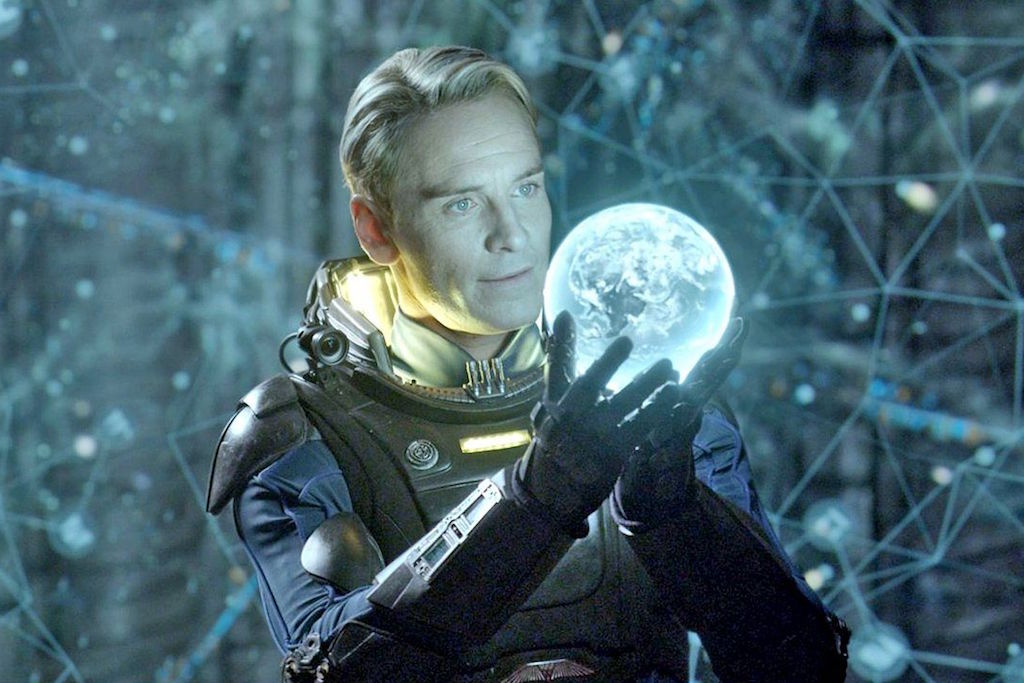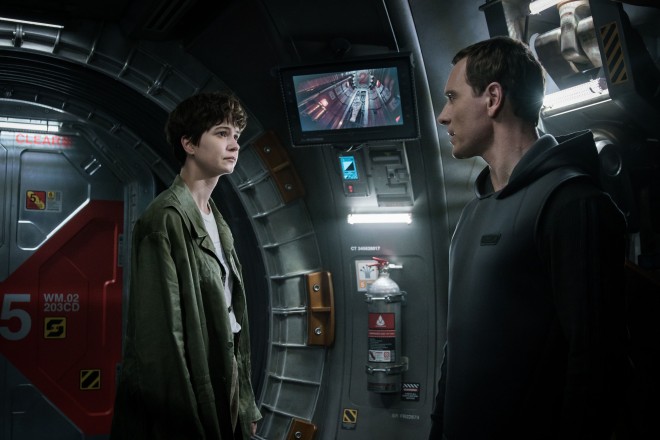‘Alien: Covenant’ Reveals The Perils And Pleasures Of Meeting Your Maker
Ridley Scott is trying to close the loop of the ouroboros he’s created. Does he succeed?

This post contains spoilers for Alien: Covenant.
–
Alien Covenant opens with two people in a clean room, glistening with the sort of sterile white that Apple has made synonymous with advanced technology. One of them is Peter Weyland (Guy Pearce), a surname that lurks behind much of the corporate skullduggery strewn throughout the Alien series. The other is a newly activated android by the name of David (an electrifying Michael Fassbender).
David is totally disinterested in the glories of nature, laid out as if in artful tableau beyond the room’s window; his focus is on the objects inside. Furniture, a painting, a piano: antiques that have withstood the yawning span of millennia. The implication is not lost on David; will he join their ranks, to be counted as one of humanity’s crowning achievements? Or, as he locks wits with the ageing, fragile man who made him, will the creation surpass the creator?
These questions are at the heart of Alien Covenant, the sixth Alien film and the one that brings the xenomorphs home to roost. Ridley Scott made the original Alien, in 1979; in turn, the film made his career. After the series took a detour through a murderer’s row of directors (James Cameron, David Fincher, and Jean-Pierre Jeunet) and the terrible Alien vs Predator films, Scott came back to the director’s chair in 2012 with the release of the utterly beautiful and utterly hollow Prometheus. As a prequel, it sought to explain some of the grand mysteries behind the Alien mythos, but it instead diminished them. It made the universe a little smaller, somehow.
Alien: Covenant is a sequel to that misfire, one with many of the same ambitions. It’s set before the original film, and draws the connecting lines even tauter. It sets in stone what has been previously left to imagination. But it does so in a way that is as compelling as it is unsettling, given life by an astonishing dual performance from Michael Fassbender.
More than that, the film is a startlingly effective take on the nature of prequels, and of artists intent on adding just one more brushstroke to their legacy. Somehow, it integrates all the weird and wonderful offshoots that have gone before, to take the series in a strange — and exciting — direction.
Alien Nation
For a series purportedly named after the xenomorph – that’s the long-limbed, shiny black beastie with a mouth within its mouth and acid for blood – the Alien series has quite the cast of non-human characters. There are ship AIs; an extraterrestrial race of humanoids known as the Engineers, who seeded the galaxy with life; and androids, indistinguishable from humans on the outside, but more often than not smarter and stronger than us.
We’ve come a long way from the villainous android Ash, as brought to life by Ian Holm in 1979. Lance Henriksen and Winona Ryder both played considerably more sympathetic synthetics in subsequent Alien films, before Prometheus introduced David, with all his glorious quirks.
The crew of the colony ship Covenant contains an android too. His name is Walter, he’s a more advanced model than David, and he’s also played by Michael Fassbender. Watching Fassbender match wits and flirt with himself is one of the highlights of Alien Covenant; there’s a sexual frisson to their interactions, including a magnificently sensual musical interlude that riffs on the perversions of intimacy so integral to the Alien canon. It’s a bravura performance, full of subtle tics and bold details, and Fassbender is absolutely tremendous in both roles.
Ridley Scott is trying to close the loop of the ouroboros he’s created.
This is very much a good thing, because the film has a pretty spectacular reveal – it turns out that it’s David who’s been breeding the xenomorphs that we know and love from the original Alien, bastardising the same biological technology that the Engineers used to create human life. He’s doing what his creator, Peter Weyland, never could – he’s bringing his perfect children to life and getting them to hunt down the imperfect humans who created him.
It’s a level of interconnectedness that could seem claustrophobic, were Alien Covenant not constantly asking huge questions – what happens when you meet your maker? Will our creations, our art or our progeny, always disappoint us? Or will they surpass us, and leave us to crumble in the dust?

There’s a fun Easter egg that lends credence to this. The crew of the Covenant is mostly made up of husband-and-wife pairs, and includes the franchise’s first gay characters. Throughout the film, the men refer to their wives in this stilted, almost awed manner, a strain of dialogue repeated too often to be anything but intentional. It jars a bit, until you consider that the authorship of the poem Ozymandias is a major plot point in the film.
David quotes it, and attributes it to Byron. Walter starts a little at this, later revealing he knew it was written by the English poet Percy Shelley. David’s inaccuracy, they both realise, is a sign that the flaws in David’s programming that allow him to create art, to create life, are slowly leading him down the path to malfunction. It’s a nice character moment, but it’s also a very cool, very sly way of signposting what’s ahead for both the film and the series — this is Ridley Scott trying to close the loop of the ouroboros he’s created.
In 1818, the same year Percy Shelley published Ozymandias — still his best-known poem — his wife anonymously published a book with a tiny print run of 500 copies. She would put her name on subsequent editions, and it’s never been out of print since; these days it’s regarded as a literary icon, the first science fiction novel, and a parable for creativity (and creations) run amuck. You might know it better as Mary Shelley’s Frankenstein.
Scott Free
The Alien series has long riffed on the more gruesome elements of creation and procreation — facehuggers impregnate hosts, xenomorphs burst from chests, and Swiss surrealist H.R. Giger’s creature and set designs are just biologically familiar enough to evoke a primal horror. This is a solid foundation for the later films’ subtext, but the Frankenstein/Prometheus creation myths resonate on a meta- level, too.
Yes, Alien Covenant is a prequel, but you get the sense Ridley Scott isn’t overly concerned with making sure everything slots neatly into place. This is nothing short of a complete thematic overhaul, the type of thing an artist can do when they revisit a formative work four decades later.
It’s hard not to see the similarities with George Lucas’ endless tweaking of Star Wars; but while that feels fidgety and inconclusive, Scott’s course correction has seen the series move from a fear of death lurking in the shadows to one questing after the meaning of life. He’s given us an existentialist allegory, stuffed with tortured, terrific characters that gaze deep into the abyss and turn away unsure if they’ve seen monsters or mirrors.

It’s also rewarding that Scott hasn’t abandoned the bizarre directions in which the series has headed — with the obvious, and welcome, exception of the bad fanfic that is Alien vs Predator. With Alien Covenant, Scott manages to celebrate and integrate not just the xenomorph and plucky heroine of the original film, but also the ballistics and the bluster of Aliens, the spartan necropolis of Alien 3, and the baroque biological experimentations of Alien: Resurrection. It’s messy, and not without its flaws, but it’s also ambitious enough to reach past the stars.
One last point: it is a fair criticism that the xenomorph gets short shrift in Alien Covenant, but it’s hard to argue that this is anything but intentional. Inextricably linking the creature to the androids is a masterstroke; never mind commenting on the uncanny valley, the film portrays it as a place both fecund and fetid, a spawning pool of inspiration and madness in equal measure.
It’s a place where the things born from our minds or bodies grow past us, out of reach or control. Despite the love and care and effort put into our art or our children, it says, they will always contain something that separates them from us, something unknowable and apart. Something alien.
–
Alien: Covenant is in cinemas now.
–
Hari Raj has worked as a journalist and editor in Malaysia, China, and Australia. He tweets about pop-culture ephemera at @jarirah.